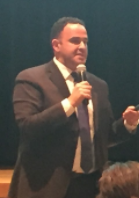Kevin Sabet Speaks: “The Truth About Marijuana”
By Matthew Wikfors

Kevin Sabet speaks to the audience at Pascack Valley. Photo by Matthew Wikfors.
On May 3, Kevin Sabet, a leading figure and researcher in the fight against marijuana, spoke to a crowd of parents and students at Pascack Valley High School in a presentation called “The Alarming Truth About Marijuana: What Everyone Needs to Know.”
Sabet is the director of the Drug Policy Institution and the co-founder of Smart Approaches to Marijuana (Project SAM), which is an organization based upon advocacy and reform against marijuana. Sabet, a former member of the drug policy administration under Former President Barack Obama, said he left because he “wanted express the research and facts in a neutral and non-partisan way.”
He began the presentation by stating that marijuana is a commercial industry like tobacco and that their job is to get people hooked. He warned the audience about some of the research people are citing since “industry funds websites and ads for marijuana.”
“The people selling you these products are not the drug dealers on the street that parents warn you about,” Sabet said, “They’re guys in suits, people that look like me.”
Sabet even claimed that the marijuana industry is like “the new big tobacco” in the sense of the way corporations are covering up the truth just like to tobacco industry. However, Sabet assured the audience that he was speaking the true facts to them tonight since SAM is partnered with multiple medical groups, state affiliates and other such business that provide statistics through studies.
He continued on to speak a little bit about what he calls myths of marijuana, including the claim that marijuana is not addictive. He explained that one of the main ingredients in marijuana,tetrahydrocannabinol, responds strongly to the brain’s THC receptors, which correspond to the reward and memory portions of the brain.
Sabet claimed that it’s “dumb to say no one died of marijuana” and noted that “we don’t know what THC does” when speaking about the high concentration of THC in modern marijuana products. Edible marijuana products, like gummy bears, are absorbed into the body and the bloodstream rather than going straight to the brain. Because of this, there can be a delayed reaction and the high will be later. These products are marketed as “kid-friendly” even though they contain toxins like banned pesticides.
Finally, he spoke about the psychological effects of marijuana. His research did not hold anything back, claiming we “need to be real about the facts.” Among the information presented were statistics about the increasing chances of psychosis for those who smoke marijuana; for example, smoking marijuana even less than once a week doubles the chance of schizophrenia and psychosis. Other mental effects of using the drug include a higher risk of suicide, an eventual bridge to heroin use and even withdrawal symptoms when a person stops using the drug.
“Mental health is like physical health,” Sabet said, “I think of substance abuse like cancer. It’s something we need to keep at, something we need to treat early.”
After the presentation, Sabet answered questions from the audience, including questions about how to help their loved ones who were using marijuana. One woman even asked a question that gave insight about the criminalization of marijuana as well as the studies being done into cannabidiol, a chemical found in the plant that can help those who don’t respond to normal medication.
This event was part of Mental Health Resource Fair at Valley held by the Hills Valley Coalition. The Hills Valley Coalition is comprised of teachers, parents, therapists, and community leaders from Montvale, Hillsdale, River Vale, and Woodcliff Lake. Gale Mangold and Pam Martorana, the co-chairmen of the group, organized the event.
“I’ve worked with students first-hand that have developed addiction issues regarding marijuana and chronic use,” Mangold said. “Their whole demeanor changes and their attitude about what’s going on in life changes.”
Mangold said that the program steered clear about the legalization of marijuana and instead focused on the mental effects the drug has on the human brain, keeping in line with the coalition’s stigma-free foundation.
There were a few pro-marijuana protests against the event with signs being taken down, and pro-legalization pamphlets left on cars. Mangold claimed that “both sides aren’t really looking at the truth on both sides.”
She also said that there are a number of people who need help but won’t get it, and that people don’t recognize that there’s a problem sometimes.
“We want to de-stigmatize mental health issues,” Mangold said. “Problems with substance abuse are part of a mental health issue and we want to project the message of stigma-free support. There are people you can reach out to.”
For more information about the speaker and his views on marijuana click here.

Matt is a senior and this is his second year as the In-Depth editor for The Trailblazer. Matt is excited to lead writers into hard-hitting journalism and write exposés. Although he’s sad his time is ending soon, he knows that his proteges will do well, but until then, he is ready to teach them all he knows!











































